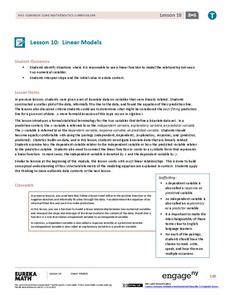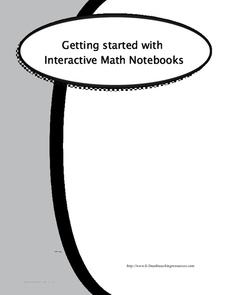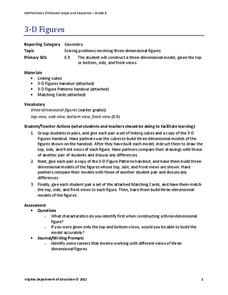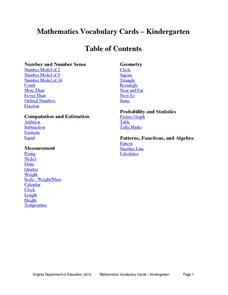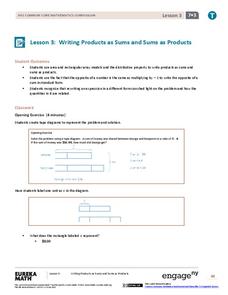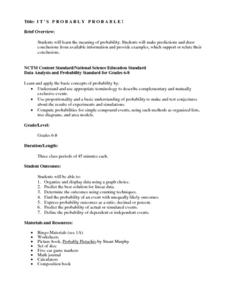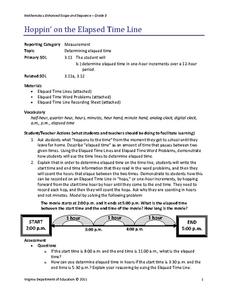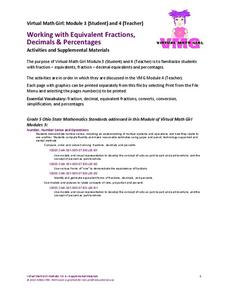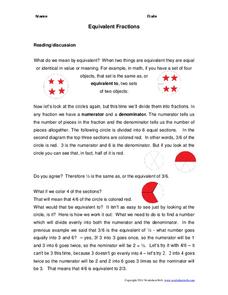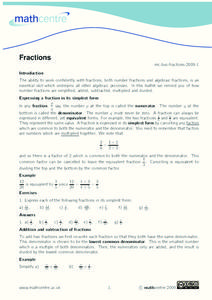Virginia Department of Education
Modeling Division of Fractions
Provide a meaningful context for learning about the division of fractions with this upper-elementary math lesson. Presented with a simple, real-world problem, young mathematicians work in small groups to develop visual models...
EngageNY
Linear Models
Expand your pupils' vocabulary! Learn how to use statistical vocabulary regarding linear models. The lesson teaches scholars the appropriate terminology for bivariate data analysis. To complete the module, individuals use linear...
EngageNY
The Relationship Between Visual Fraction Models and Equations
Ours is to wonder why, not just to invert and multiply. The seventh installment of a 21-part module uses fraction models to help pupils understand why the invert-and-multiply strategy for dividing fractions works. They then work on some...
Curated OER
Getting Started with Interactive Math Notebooks
Set young mathematicians up for success with this interactive math notebook. Including a list of rules and expectations for using the notebooks, as well as templates for a creating a cover page and table of contents, this resource...
Virginia Department of Education
3-D Figures
Scholars construct three-dimensional figures to study dimension and side views. Learners build models using linking cubes to match views of different sides. After practicing with models, they attempt to match three-dimensional drawings...
Virginia Department of Education
Mathematics Vocabulary Cards - Kindergarten
Enhance your math lesson with a series of pictures that illustrate different math concepts. The vocabulary includes a variety of ideas and pictures including fractions, ordinal numbers, picture graphs, and number lines.
02 x 02 Worksheets
Inverse Variation
Discover an inverse variation pattern. A simple lesson plan design allows learners to explore a nonlinear pattern. Scholars analyze a distance, speed, and time relationship through tables and graphs. Eventually, they write an equation to...
Busy Teacher’s Café
"Smart" by Shel Silverstein
Find out just how smart your young mathematicians are with this cross-curricular math and language arts lesson. After first reading Shel Silverstein's poem "Smart", students draw pictures of coins to model the different exchanges...
EngageNY
Writing Products as Sums and Sums as Products
Create rectangle and area models to help students understand expressions. The third installment in the 28-part series has pupils first represent expressions using rectangular array models. The exercises help scholars understand the...
EngageNY
Truncated Cones
Learners examine objects and find their volumes using geometric formulas in the 21st installment of this 25-part module. Objects take the shape of truncated cones and pyramids, and individuals apply concepts of similar triangles to find...
Scholastic
Study Jams! Multiplication
What does baking cupcakes have to do with multiplication? Watch this video and find out as your class learns that multiplication is the repeated addition of equal groups. Properties of multiplication are also introduced with...
EngageNY
The Definition of a Parabola
Put together the pieces and model a parabola. Learners work through several examples to develop an understanding of a parabola graphically and algebraically.
North Carolina State University
Exploring Genetics Across the Middle School Science and Math Curricula
Where is a geneticist's favorite place to swim? A gene pool. Young geneticists complete hands-on activities, experiments, and real-world problem solving throughout the unit. With extra focus on dominant and recessive genes, Punnett...
National Security Agency
It's Probably Probable
Learners make predictions and draw conclusions from given information as they learn the meaning of probability in this vocabulary-rich, integrated activity that presents a variety of teaching strategies to motivate and reach...
Virginia Department of Education
Integers: Addition and Subtraction
Young mathematicians construct their own understanding of integers with an inquiry-based math lesson. Using colored chips to represent positive and negative numbers, children model a series of addition and subtraction problems as...
Virginia Department of Education
Hoppin' on the Elapsed Time Line
Time flies when you're teaching math! Okay, maybe not for everyone, but this lesson will have your young mathematicians calculating elapsed time before you know it.
EngageNY
Real-World Positive and Negative Numbers and Zero
Class members investigate how positive and negative numbers are useful in the real world. Individuals first read a short passage and identify terms indicating positive and negative numbers. They consider situations involving positive...
PBS
Working With Equivalent Fractions, Decimals and Percentages: Activities and Supplemental Materials
Reinforce math concepts using six worksheets that coincide with Virtual Math Girl's video instruction. The practice pages' objectives include writing equivalent fractions, decimal equivalents, and converting percents to decimals and...
EngageNY
Motion Along a Line – Search Robots Again
We can mathematically model the path of a robot. Learners use parametric equations to find the location of a robot at a given time. They compare the paths of multiple robots looking for parallel and perpendicular relationships and...
Worksheet Web
Equivalent Fractions
Learn how to identify equivalent fractions by using divisors. After reading and discussing the skill, young mathematicians solve two problems using visual fraction models, and then solve eight equivalent fraction problems...
Illustrative Mathematics
Grandfather Tang's Story
It's amazing the complex figures that can be made using only a few simple shapes. Following a class reading of the children's book Grandfather Tang's Story by Ann Tompert, young mathematicians use sets of tangrams to create models...
Mathematics Vision Project
Module 2: Linear and Exponential Functions
Write, graph, and model all things linear and exponential. Building on the previous module in a nine-part Algebra I series, learners compare linear exponential modeling. They write equations, graph functions, and analyze key features.
Math Centre UK
Fractions
Reinforce fraction instruction with an informative worksheet equipped to provide independent practice, as well as guidance and modeling. Support is provided to boost proficiency in finding equivalent fractions, and adding,...
Virginia Department of Education
Multiplying Polynomials Using Algebra Tiles
Tiles are not just for algebra—see how they can help with multiplication too. Young mathematicians learn to use algebra tiles to model the multiplication of polynomials. A follow-up worksheet provides practice with the skill.

